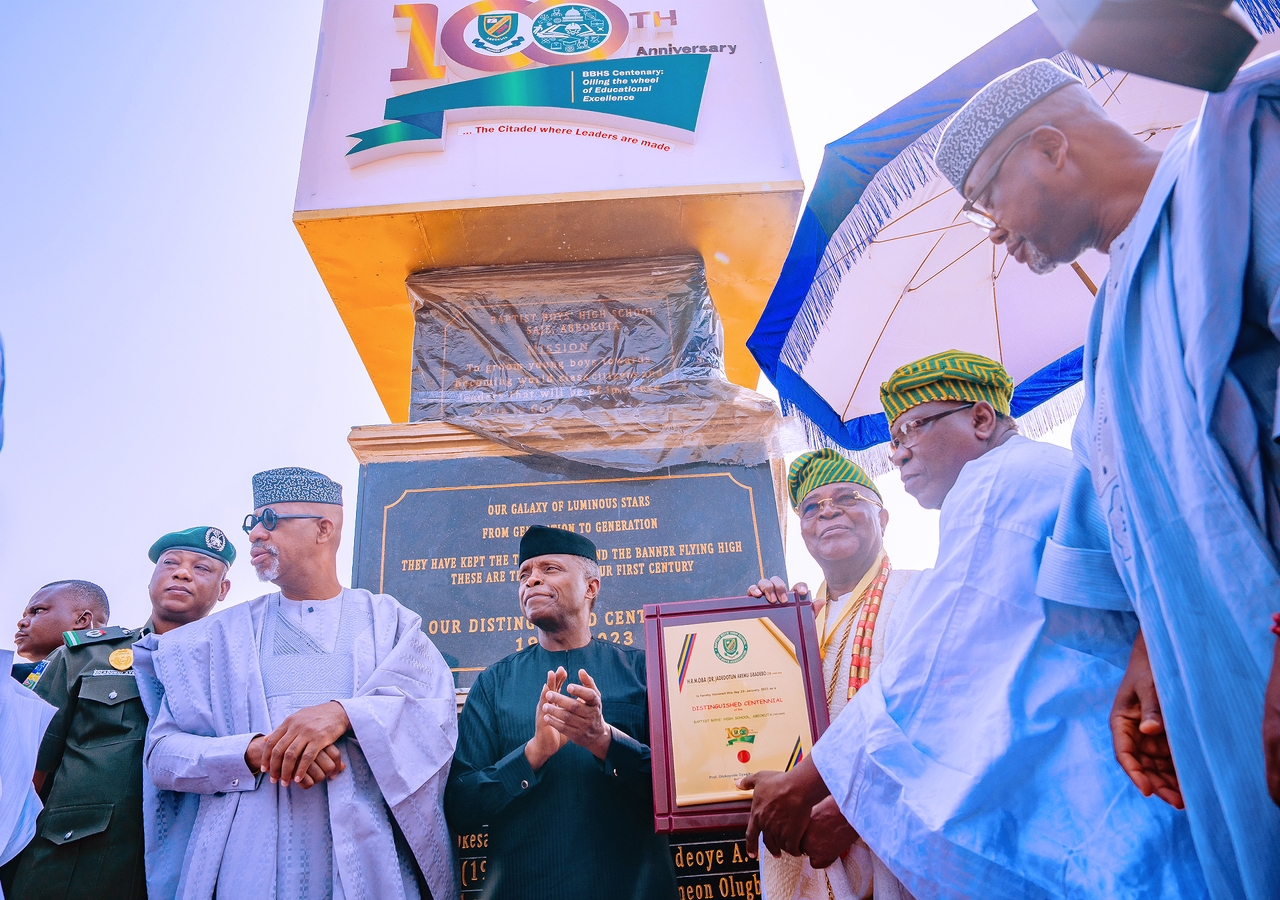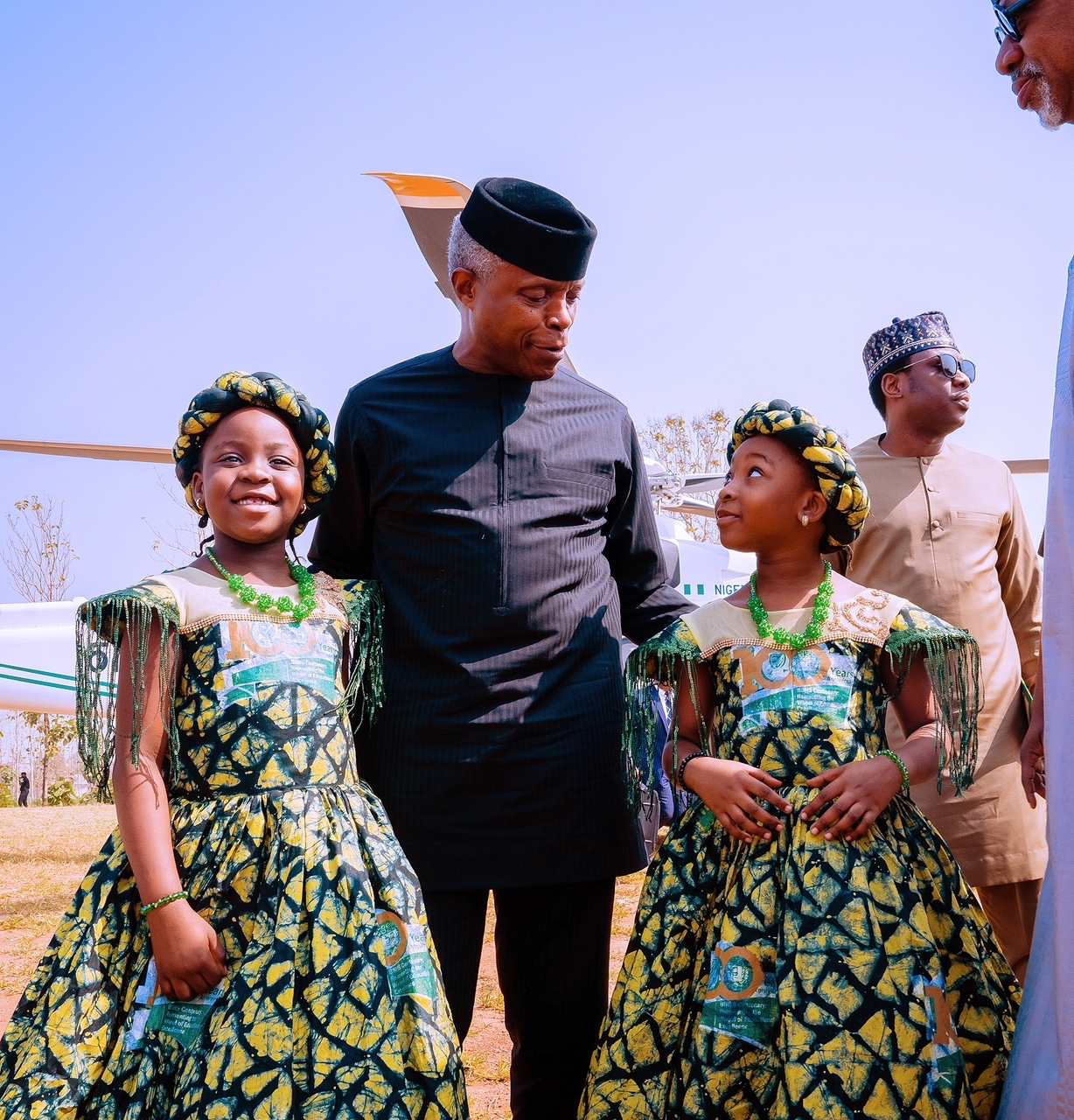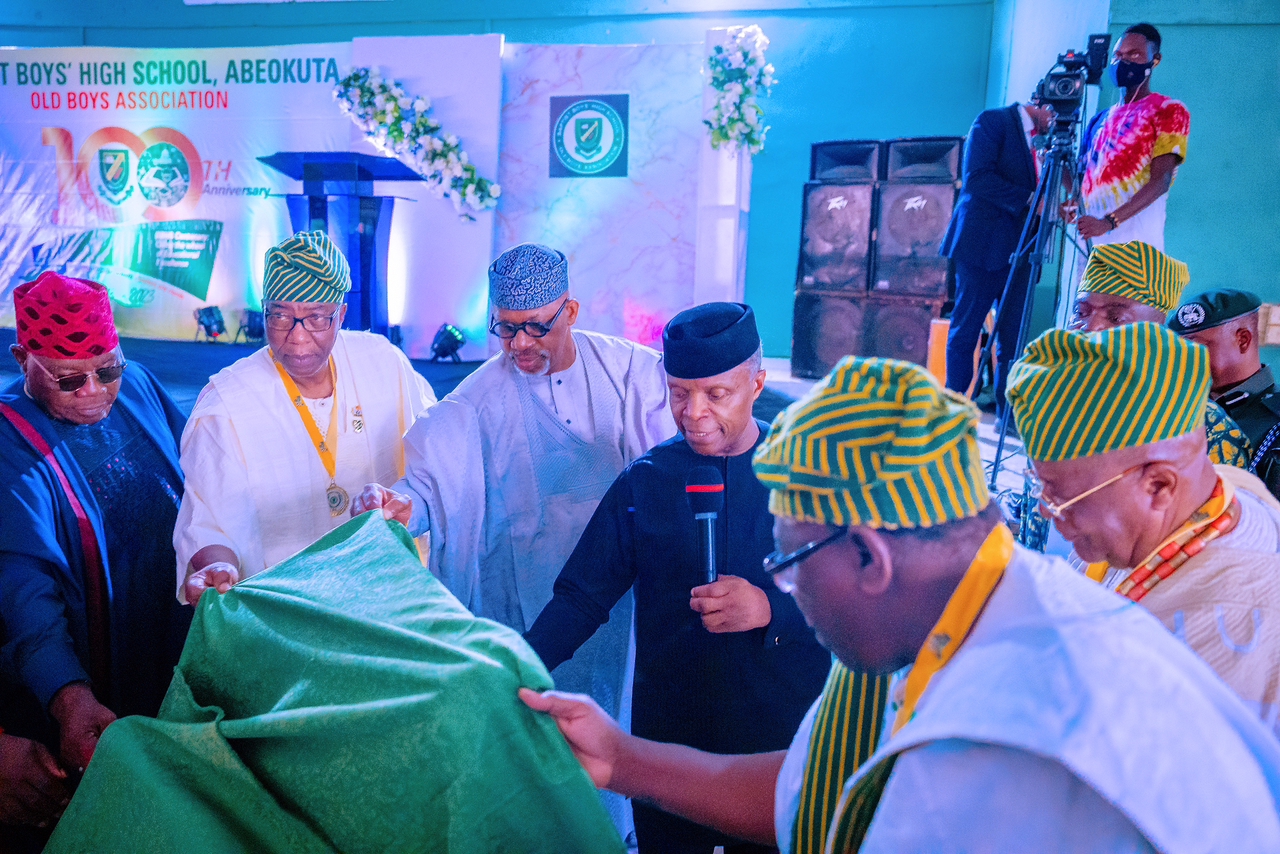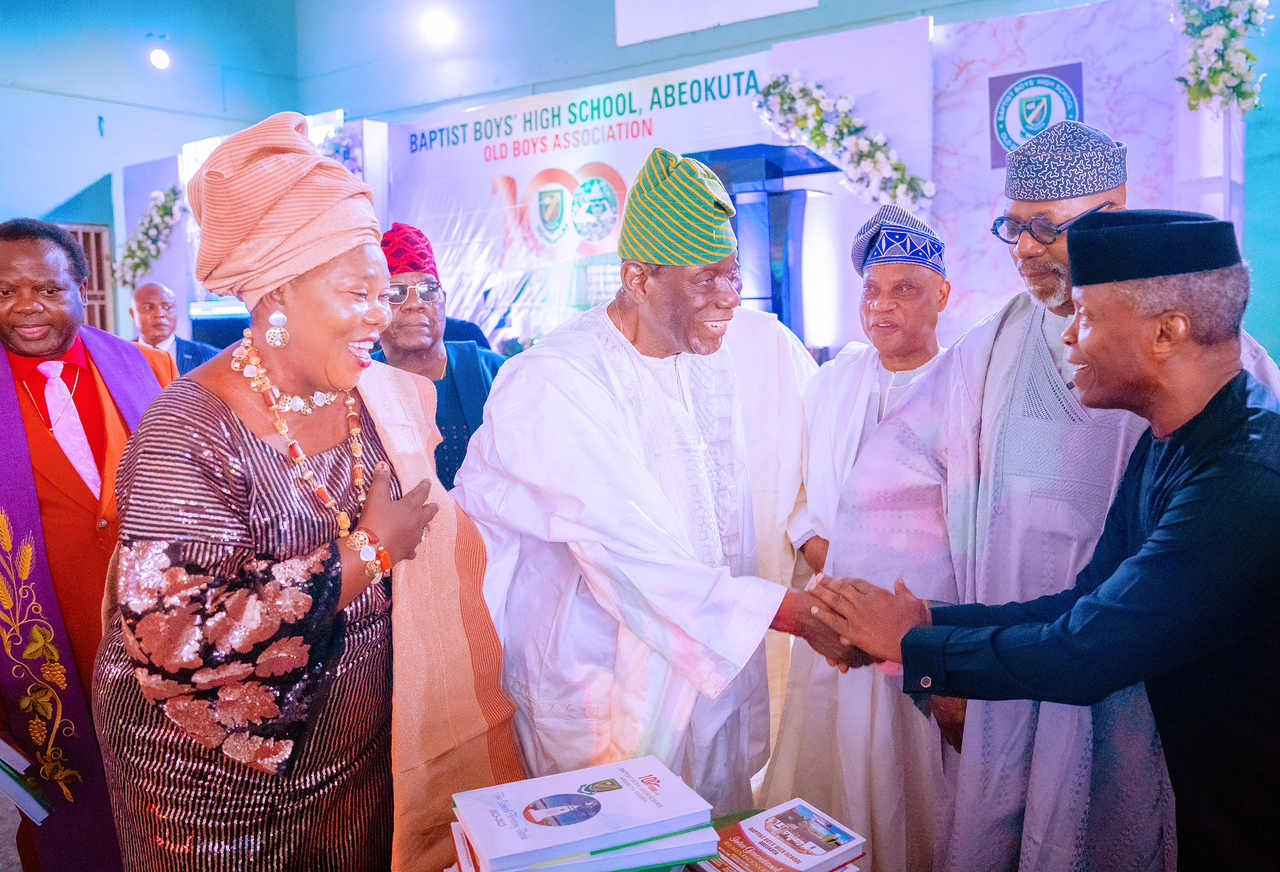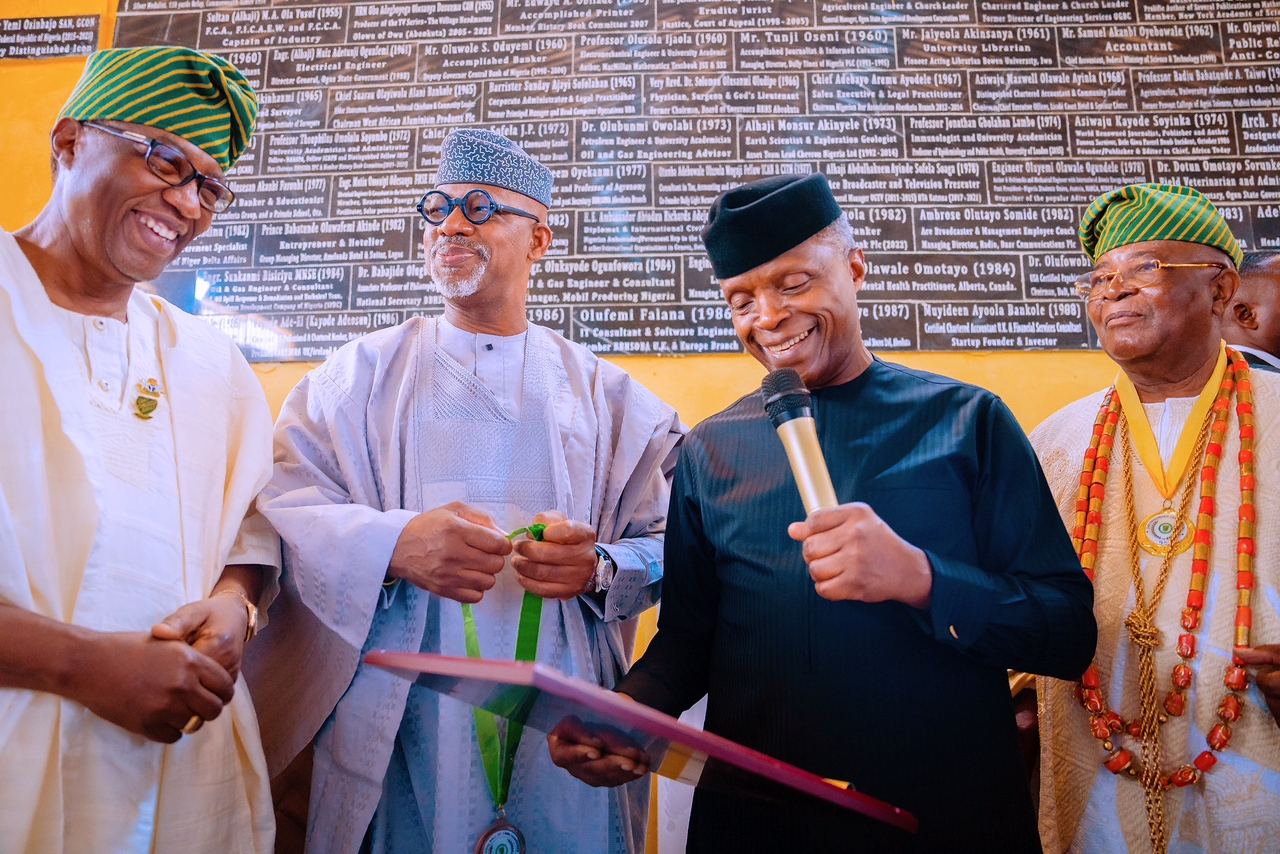Centenary Lecture At The Baptist Boys’ High School (BBHS) In Ogun State
CENTENARY LECTURE DELIVERED BY HIS EXCELLENCY, PROF. YEMI OSINBAJO, SAN, GCON, VICE PRESIDENT OF THE FEDERAL REPUBLIC OF NIGERIA AT THE 100TH ANNIVERSARY OF THE BAPTIST BOYS’ HIGH SCHOOL (BBHS) TITLED THE VALUES: THE DIFFERENCE BETWEEN SUCCESS AND FAILURE IN ABEOKUTA, OGUN STATE ON THE 17TH OF JANUARY, 2022
PROTOCOLS
First let me thank the Chair of the Board of Trustees of the Baptist Boys High School Old Boys Association, His Royal Majesty, the Alake and Paramount Ruler of Egbaland, Oba Dr. Adedotun Gbadebo CFR, and the National President of the Association, Professor Kayode Oyesiku for the kind invitation to attend this ceremony and the privilege of delivering the commemorative centennial anniversary lecture.
It is a great honour indeed to have been invited to join you, the old boys of the great Baptist Boys High School, (BBHS) present students, and friends of the college at this Centennial celebration.
The true test of an academic institution is the quality and achievements of its products in life. By this standard, BBHS is most certainly outstanding. A few minutes ago, we unveiled the Commemorative Centennial Obelisk with the names of the distinguished centennials inscribed upon it.
These 100 distinguished old boys were selected from so many for special recognition – men who have attained national and international renown in academia, the professions, business, politics, and civil society. Because the list is only 100, there are as many and even more who are clearly deserving of the status, but are left out because of lack of space. What an incredible legacy!
I will be speaking for a few minutes on the subject – Values: The Difference between Success and Failure. Let us adopt a simple definition of values – values are ethical principles by which individuals and communities live, work and interact. These include honesty, integrity, trustworthiness, perseverance, hard work, diligence, discipline, patience, respect, etc.
As I had mentioned earlier, the pantheon of old boys of the BBHS is like a who-is-who in Nigeria politics, the professions, civil society, and commerce and industry. But in order to establish the point I want to make today on the question of values, I will refer to four of the old boys of BBHS who have held high positions in the public service of Nigeria.
Let me repeat the point, it is values that determine the success or failure of individuals or societies.
Chief Obafemi Awolowo GCFR, SAN, (1928 set of BBHS) the first premier of the then Western Region, and described in death by Chief Emeka Odumegwu Ojukwu as the best President Nigeria never had, and pioneer of Free Education in Nigeria, investing over 41% of the budget of the Western Region in education. He built the first television station in Africa and at that time, Canada, Netherlands, and Belgium didn’t have TV stations. It was not just the first in Africa but in many parts of Europe and Asia. He built the tallest building in Ibadan, Nigeria at one point (Cocoa House with 26 floors), farm settlements, road infrastructure, etc.
He fought for true democracy, and clashed with the then National government, rejected any moves to compromise his position on behalf of the Western region. He was unfairly jailed but remained resolute not conceding his position until he was freed by the government then of General Yakubu Gowon.
The next is Chief Olusegun Obasanjo GCFR (1957 set of BBHS), a Military President who set a standard of honour when he handed over power according to the promise made by his administration to an elected Civilian Government and went on to become an elected President for 2 consecutive terms. Obasanjo also ended up in prison unfairly and unjustly. While there, he refused to compromise his position and remained resolute until he was freed.
The third is Chief MKO Abiola, GCFR, (1956 set of BBHS). His GCFR was awarded posthumously. He won the free and fair Presidential election in 1993. the then Military government annulled the election and expected him to surrender his mandate. He refused, in an act of tremendous courage because he had to face the Military regime at the time, he not only declared himself as President, he willingly went to jail. While he was incarcerated, he refused to renounce his mandate until he died.
I mention only these three men because they stood resolutely for principles even in the face of great temptation to compromise, they made personal sacrifices or suffered for their beliefs. They possess something that set them apart from others. They seemed to have imbibed something that made them so resolute even in the face of fearful and daunting challenges. They remained adamant in the face of the temptation to compromise. They were extraordinary in that sense.
Standing by one’s beliefs and principles even if it means pain or punishment is a special trait indeed.
I will spend a bit more time on the fourth example because of the four, he is the one I worked with directly and I did so for 5 years. He is His Excellency, Prince Bola Ajibola SAN, (1955 of the BBHS). One-time President of the NBA, one-time Attorney General, and Minister of Justice of the Federation served as Judge of the International Court of Justice of the World Court, and also as Nigeria’s Ambassador to the UK.
I was 30 years old when I was appointed as Special Adviser to Prince Bola Ajibola, then Attorney General of the Federation and Minister of Justice. This was my first experience in public service and it was in hindsight the best introduction to public service. Judge Ajibola was a man who had been tremendously successful as a lawyer and arbitrator and ended up being the MBA President.
Let me mention three defining events that I personally witnessed while working with him.
The first was a situation where a foreign contractor that had won a lucrative contract from the Federal Government went to give a car to Judge Ajibola’s son who was then at a University in England at the time. Judge Ajibola’s son told his father that the contractor had sent a car to him and I had never seen him so angry. I had to make him seat down because he was physically angry. Not only was the gift returned, but the man was also reported to his government. His government had to make a special apology to our own government and to Judge Ajibola. I remember when he came to the Ministry to apologize to the Attorney-General for offering a bribe to him.
The second incident was a commercial aircraft arrested in Nigeria for carrying drugs. The office of the Attorney General was responsible for a very successful lawyer who claimed he was acting as an intermediary for some interests that were connected to the airport. He came to offer the AG a large sum of money in Foreign Exchange. When I recall how Prince Bola Ajibola shouted at the senior lawyer and ordered him out of his office, I still remember the shame and fear on the face of the man.
These two incidents show that Judge Ajibola believed that Public Service was Public Service and that bribes of any kind were completely unacceptable. He set that very high standard even then.
In later years, Bola Ajibola decided that his life work will be the establishment of a university. He sold every property he had in Lagos at the time and moved to his home in Abeokuta. He established Crescent University with all the resources he had. Today he runs that university and subsidizes the cost for students.
When I asked him why he was selling everything he had to establish the university, he said that “at the end of the day, wealth means nothing if it doesn’t positively impact the lives of others.”
Today Bola Ajibola is in his home in Abeokuta, very old and frail but he is a satisfied man.
The important thing that runs through all of the four persons I have mentioned is they became significant and distinguished themselves because they were extraordinary human beings and remain so. They stand out because of what they imbibed here in BBHS. They imbibe high standards of integrity, and stubbornness even in the face of compromise. They also had trustworthiness, trusted by people for what they believed in.
But what is it that a school imbues in its students that makes them so outstanding in life? May I respectfully submit that it is the same things that make societies or nations great – values, integrity, hard work, and trustworthiness.
The difference between men and women who attain significance and those who do not are values. I am not talking about people making money, anybody can make money. Money is not a measure. Attaining recognition and significance, the kind of position and place that years and years afterward, men and women will remember you and say this was a great person, involves a bit more than just having money.
This is what we have seen that schools such as BBHS imbue in their students. It is the difference between successful societies or countries and failed or failing countries.
It is evident that huge deposits of natural resources and human talent alone do not make for prosperous nations. Otherwise, the countries with the largest deposits of mineral wealth would be the most prosperous. Venezuela has one of the largest oil deposits in the world but the UN estimates that 94% of its citizens are poor.
The Great Lakes region in Africa has some of the world’s richest mineral deposits, yet the countries in the region are some of the poorest in the world. On the other hand, some of the wealthiest countries in the world and those that have the most companies listed on the world stock exchanges are Israel, China/Hong Kong, Taiwan, India, South Korea, and Singapore — none of which have any natural resources.
It is also obvious that while geography might play an important role in the success of people and communities, they are not defining features. What is it that distinguishes people, setting one apart from the other is not just talents and material resources, it is the values you live by.
Every one of the great and successful economies of the world share the same characteristics, they emphasize hardwork, and integrity. The public intellectual Schleicher said, “knowledge and skills have become the global currency of 21st-century economies, but there is no central bank that prints this currency. Everyone has to decide on their own how much they will print.”
“The thing that will keep you moving forward,” says Schleicher, is always “what you bring to the table yourself. Knowledge and skills, the man with knowledge and skills will rule over the man with undeveloped talents and material resources.” This is why those with knowledge and skills come to our countries to exploit the mineral resources. Knowledge and skills depend on education.
How do you acquire knowledge and skills? it is only by the hard work of education. How do you trade successfully? You must produce high-quality manufactured goods, that are trusted for performance and quality. Trustworthiness comes in.
If you are manufacturing a plane or even any automated vehicle, this requires precision, you can’t afford to be sloppy, this is diligence. Now driverless cars are being manufactured and you need hard work education and diligence. Even if you have all the raw materials to make the best vehicles, you cannot make them without skills, and knowledge.
How do you become the preferred lawyer or accountant? Diligence and hard work.
We have seen from the four examples of the BBHS old boys who were in public service and who attained significance and greatness, that their success was not based on talent, or opportunity alone. They all worked hard, but they also showed courage and integrity. They fought for what they believed in and in three of the four cases, they were unjustly jailed for their beliefs or for reasons of their views or positions being considered threats to the authorities of the day.
I believe that BBHS has shown that Nigeria can produce the highest quality individuals and run the most efficient governments and private institutions if we teach the right values in our schools.
There is a need for a national consensus or at least an elite consensus. The political elite, religious elite, and business elite must agree that our country will fail completely if we do not accept and implement an ethical revolution. One where we establish a national work ethic of honesty, hard work, thrift, and the deferment of gratification.
It is what is taught and learned that shapes the character of individuals and nations. But it is not just teaching, governments must lead this ethical revolution by rewarding ethical behaviour and ensuring speedy punishment for misconduct.
The religious elite must reinforce the ethical direction agreed upon by showing that wealth and influence are built by hard work, diligence, and the deferment of gratification and not just by miracles. The religious elite must also reject and ostracize public officers and persons whose wealth cannot be explained or is clearly from shady or suspicious sources.
It is a terrible thing indeed if the religious elite accepts that public officers can give them money or resources which belong to the government and they look the other way. The religious elite must ensure that they are able to say no and this is all part of the national ethical consensus – as the government does its own, schools do theirs, religious elites must also do their own.
Every modern society has had to deal with corruption. Corruption is not a Nigerian thing. Most countries of the world had more corruption than us but their elites sat down and decided that they had to deal with it. If they don’t deal with it, it would deal with them.
There is no modern society today that did not have to deal with corruption and they did this with the elites agreeing to it and not repeating the same things. We must enthrone minimum ethical standards to succeed.
So let me end by congratulating the old boys and current students of this outstanding institution for providing men with outstanding ethical standards through the years. And I wish you several more centuries of positive impact on Nigeria and the world.
Thank you very much.


